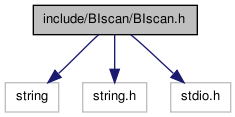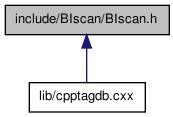BIscan.h File Reference
Defines namespace BIscan which provides routines which perform fast and flexible scanning of character buffers and strings for the builtin types: More...
#include <string>#include <string.h>#include <stdio.h>
Include dependency graph for BIscan.h:

This graph shows which files directly or indirectly include this file:

Go to the source code of this file.
Classes | |
| struct | BinaryParsed< IntegerType > |
| This class is a wrapper around a reference to an integer, which exists so that that operator>> can be specialized such that when a binary object is serialized, it will parse the stream for a binary integer instead of a decimal integer. More... | |
| struct | HexParsed< IntegerType > |
| This class is a wrapper around a reference to an integer which exists so that that operator>> can be specialized such that when a Hex object is serialized, it will parse the stream for a hex integer instead of a decimal integer. More... | |
| struct | IsIntType< T > |
| Wrapper around the member, value, which will be 1 if T is an integral type (including unsigned char but not regular char). For all other types, value will be 0. More... | |
| struct | OctalParsed< IntegerType > |
| This class is a wrapper around a reference to an integer which exists so that that operator>> can be specialized such that when a Octal object is serialized, it will parse the stream for a octal integer instead of a decimal integer. More... | |
| struct | SKIPSET |
| An object which represents a set of characters which a Stream should ignore when parsing with operator>>. The parsed characters are discarded from the stream. At least one member of the set must appear or an error results. More... | |
| class | Stream |
| A Representation of a stream of bytes that can be parsed quickly. See its related operator >> functions. The Stream does not own the bytes, and so they must not be changed or destroyed while the parsing process is in effect. More... | |
| struct | StreamReader< T, TypeCategory > |
| StreamReader is a class used to parse integers out of stream. The default implementation will not allow ANY class to compile. You must use a specialization to get the code to compile. See StreamReader specializations below. We made add specializations to StreamReader later to allow other kinds of classes to be parsable. More... | |
| struct | StreamReader< T, 1 > |
| Decimal Integer StreamReader. More... | |
| struct | StreamReader< T, 3 > |
| Hexadecimal Integer StreamReader. More... | |
| struct | StreamReader< T, 5 > |
| Octal Integer StreamReader. More... | |
| struct | StreamReader< T, 7 > |
| Binary Integer StreamReader. More... | |
Namespaces | |
| namespace | BIscan |
Namespace BIscan defines a variety of fast text scanning classes and functions which eliminate the overhead found using iostreams when scanning simple text buffers for builtin types. Basically, using class BIscan::Stream is like using sscanf -- and is 3X faster for integers because of inlining. For example: | |
Functions | |
| template<class IntegerType > | |
| BinaryParsed< IntegerType > | Binary (IntegerType &t) |
| Construct a wrapper around an integer reference to indicate to the Stream parsing logic that the integer should be parsed as binary. | |
| template<class StringType > | |
| bool | convertDouble (StringType const &s, double &d) |
| Convert a string, possibly with leading blanks, into an double. | |
| bool | convertDouble (char const *const &s, double &d) |
| Convert a string, possibly with leading blanks, into an double. | |
| template<class StringType > | |
| bool | convertFloat (StringType const &s, float &f) |
| Convert a string, possibly with leading blanks, into an float. | |
| bool | convertFloat (char const *const &s, float &f) |
| Convert a string, possibly with leading blanks, into an float. | |
| template<class T , class StringType > | |
| bool | convertInteger (StringType const &s, T &integer, int base=10, int signable=true) |
| Convert a std::string, possibly with leading blanks, into an integer. | |
| template<class T > | |
| bool | convertInteger (char const *const &s, T &integer, int base=10, int signable=true) |
| Convert a string, possibly with leading blanks, into an integer. | |
| int | digitValue (char c, int base=10) |
| Determine the numeric value of a character in a given base. The character and the base are assumed to be a valid combination and no error checking is done, use isValidDigit() for that. | |
| template<class IntegerType > | |
| HexParsed< IntegerType > | Hex (IntegerType &t) |
| Construct a wrapper around an integer reference to indicate to the Stream parsing logic that the integer should be parsed as hexadecimal. | |
| bool | isValidDigit (char c, int base) |
| Determine if a character is a valid digit in the specified base. | |
| template<class IntegerType > | |
| OctalParsed< IntegerType > | Octal (IntegerType &t) |
| Construct a wrapper around an integer reference to indicate to the Stream parsing logic that the integer should be parsed as octal. | |
| Stream & | operator>> (Stream &s, SKIPSET const &cs) |
| Verify that the specified stream contains one or more characters which is found in the specified character set. | |
| template<class IntegerType > | |
| Stream & | operator>> (Stream const &s, BinaryParsed< IntegerType > o) |
| This overload of the Stream output operator is designed to trigger binary rather than decimal parsing of of integers from the stream. The BinaryParsed<> object which is passed in as a parameter is nothing more than a wrapper around some integer which should be parsed as hex rather than decimal. Unlike the i/o streams, there are no stream states, instead, you accomplish hex parsing like this: | |
| template<class IntegerType > | |
| Stream & | operator>> (Stream const &s, OctalParsed< IntegerType > o) |
| This overload of the Stream output operator is designed to trigger octal rather than decimal parsing of of integers from the stream. The OctalParsed<> object which is passed in as a parameter is nothing more than a wrapper around some integer which should be parsed as hex rather than decimal. Unlike the i/o streams, there are no stream states, instead, you accomplish hex parsing like this: | |
| template<class IntegerType > | |
| Stream & | operator>> (Stream const &s, HexParsed< IntegerType > h) |
| This overload of the Stream output operator is designed to trigger hexadecimal rather than decimal parsing of of integers from the stream. The HexParsed<> object which is passed in as a parameter is nothing more than a wrapper around some integer which should be parsed as hex rather than decimal. Unlike the i/o streams, there are no stream states, instead, you accomplish hex parsing like this: | |
| Stream & | operator>> (Stream const &s, float &f) |
| Skip leading blanks then parse a floating point number from the stream and store it into a float variable. | |
| Stream & | operator>> (Stream const &s, double &d) |
| Skip leading whitespace then parse a double precision floating point number from the stream and store it into a double variable. | |
| Stream & | operator>> (Stream const &s, std::string &str) |
| Parse a std::string out of the Stream. Skip leading whitespace. Does not nul terminate str. | |
| Stream & | operator>> (Stream const &s, char const *skipString) |
| Compare the contents of the stream to a specified string. If the stream contents exactly match all the characters in the string, in sequence, then the stream is moved passed the match. | |
| template<size_t N> | |
| Stream & | operator>> (Stream const &s, char(&array)[N]) |
| Parse a string out of the stream and store it in an array of characters. Note that you must supply an array rather than a pointer for this to work. | |
| Stream & | operator>> (Stream const &s, char &c) |
| This overload of operator>> allows you to read characters out of Stream without ignoring whitespace. Its pretty sluggish though, you should probably consider using some other interface for any kind of bulk processing. See. | |
| template<class IntegerType > | |
| Stream & | operator>> (Stream const &s, IntegerType &variable) |
| Template operator >> for the Stream class. It handles all data types for which specific overloads are not aleady defined, below. | |
| template<class Iterator > | |
| bool | parseDouble (Iterator &firstRef, Iterator const &last, double &d) |
| Parse a double from a string. Leading blanks are ignored. | |
| template<class T , class Iterator > | |
| bool | parseInteger (Iterator &startRef, Iterator const &end, T &integer, int base=10, bool signable=true) |
| Parse a signed or unsigned integer from a character range and store it in a integer variable. Remove leading blanks first. | |
| template<class Iterator > | |
| bool | parseUnsignedDecimal (Iterator &start, Iterator const &end, unsigned long long &tmp) |
| A hardcoded parser for base 10 numbers which is used to speed it up parseInteger() slightly. | |
| Stream | stream (char const *begin, size_t length) |
| One of a family of overloaded functions that returns a stream whose type is based on its parameters. | |
| template<class StringType > | |
| Stream | stream (StringType const &s) |
| One of a family of overloaded functions that returns a stream whose type is based on its parameters. | |
| Stream | stream (char const *begin, char const *end) |
| One of a family of overloaded functions that returns a stream whose type is based on its parameters. | |
| Stream | stream (char const *const &p) |
| One of a family of overloaded functions that returns a stream whose type is based on its parameters. | |
Detailed Description
Defines namespace BIscan which provides routines which perform fast and flexible scanning of character buffers and strings for the builtin types:
- integers
- strings
- floats
- character arrays
Definition in file BIscan.h.
 1.6.3
1.6.3